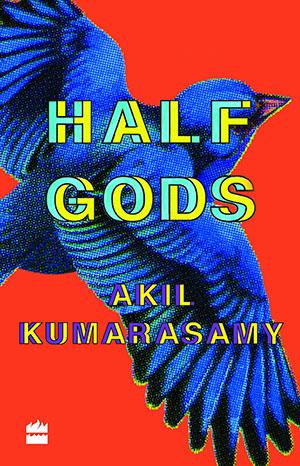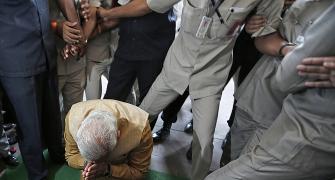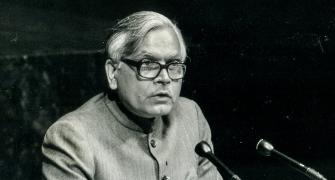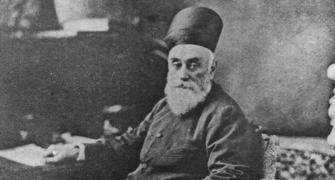Few debut novels in recent times have been received with such critical applause as Akil Kumarasamy's Half Gods.
'The prose itself is a marvel,' declared The New York Times Book Review.
A glimpse of Akil Kumaraswamy's ability to 'distill the mysteries of the human soul', revealed in this excerpt from her story The Office of Missing Persons.
Illustration: Dominic Xavier/Rediff.com

On the night his elder son went missing, V S Jeganathan dissected a monarch butterfly.
He measured the span of the wings three times before his younger son and wife returned to his study with the same worried expressions.
Outside the clothes on the laundry line inflated and danced in the breeze.
"I'll leave for the capital tonight," he said, reaching for his blazer, the fabric squeezed between a fortress of boxes, still unpacked after all these years.
"Don't you disappear too," his wife said.
Near midnight he climbed onto the bus in Thirunelveli and as he held out his fare, he became aware of the weight of his hand, the conductor's hesitation before accepting his payment.
The man's face folded in disgust.
Only then did Jeganathan notice the crushed fragments of wings, insect legs sticking to his fingertips.
The main room of the police station was painted a sunny yellow.
A bronze statue of the Buddha greeted him when he entered and partially hid the crack that ran down the center of the front wall, where a policeman sat at his desk hunched over an open magazine.
The man was exceptionally thin except for his belly, which hung like a rice sack so even the crook of his neck seemed to bow.
He was too busy grazing his fingers against an advertisement of a woman sniffing perfume to see him, and when Jeganathan first spoke, the officer looked up perturbed, his open hand lightly smacking the printed lady.
Holding out a school photograph, Jeganathan began to speak Sinhala in a slow, precise manner as if he were walking on a tightrope, his son's life caught in the balance of enunciating a language he had not needed to speak for the past three years living up in the north.
As he described Jeevan's disappearance, the officer tapped his fingers together and stared at framed portraits of President Mahinda Rajapaksa and the ex-president Chandrika Kumaratunga hanging from the wall.
The officer asked for Jeganathan's son's name and he knew it was a trick.
He needed his name to find him and then have reason not to find him.
The officer placed his gold wire-rimmed glasses on his face.
He opened a black binder, wet his thumb on the inside of his lip, and glanced over the papers.
He filled in Jeevan's information on a sheet alongside other names.
"Where was he headed?" he asked.
Jeganathan paused. "He did not return home after his studies."
"These young Tamil boys always getting into trouble.
They don't know how to be proper citizens," the officer said and scratched something on the paper in blue ink.
Jeganathan remembered his younger boy, Prem, shaking on the floor as they questioned him, his eyes flushed with tears as he cut through the bond of the womb and revealed the trip Jeevan had planned that night with Amutha to the local Shiva shrine, and before then all their meetings under the neem trees by the abandoned pharmacy, the way his brother unraveled her braid, tied her hair around his hand like a bandage.
The officer asked for a description of the missing boy beyond the photograph.
Jeganathan lifted his hands and attempted to re-create Jeevan for the officer, but under the dim fluorescent light, any conjuring was hopeless.
In the end, the officer wrote: 17 years old, 181 centimeters, 76 kilograms, birthmark on right arm.
"When will the search begin?"
"It has already begun," the officer said.
"How can that be? I just got here."
The officer waved off the question and proceeded to speak, pointing a finger at Jeganathan's head like a pistol.
"We will tell you if we find him."
Outside the police station was a truck filled with goats.
They cried out to him, and Jeganathan, with the collar of his shirt twisted and his hair uncombed, stood next to the vehicle as the creatures nibbled on the pasture of his head.

Excerpted from Half Gods by Akil Kumarasamy with the kind permission of the publishers, Harper Collins India.










